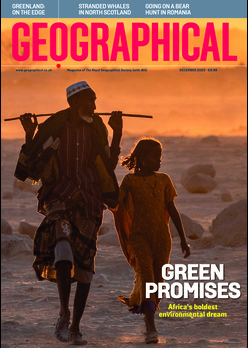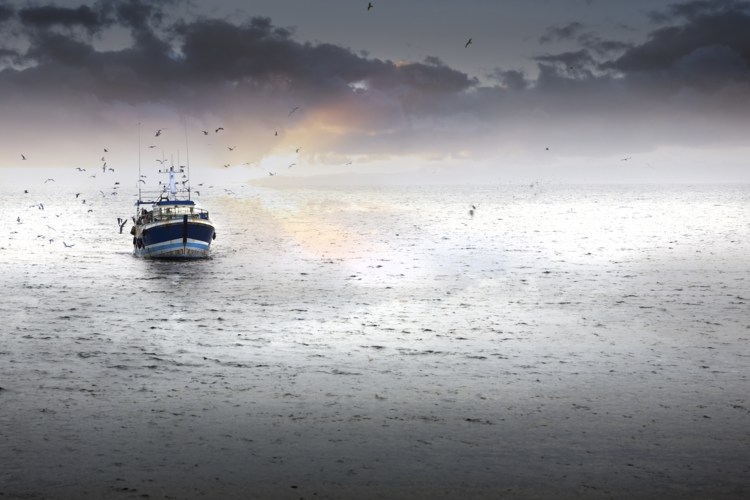
From fisheries around the globe to urban sustainability in Copenhagen, join us as we explore the world in the latest issue of Geographical
In our September issue, discover more about the vast role Copenhagen is playing in urban sustainability; head to the skies of the UK as volunteers and farmers seek to protect the curlew, and peruse through winning photographs from the Mangrove Photography Awards.
Our columnists bring an array of topics to the forefront to help you stay on top of the world: Marco Magrini explores the importance of stewardship for our planet, while Tim Marshall discusses the long-running territorial feud between Cambodia and Thailand. Maya Savir argues that calls for justice, equality and ceasefire in Gaza are pivotal.
This month, the magazine features a special report on fisheries. Mark Rowe discusses how we are pushing the sea closer and closer to breaking point.
Bryony Cottam explores how we may be overlooking a major source of global methane emissions, while Rory Walsh visits a charming Cheshire castle with ancient foundations. In our latest Passport, tour operator Stephen Shaw gives some insider tips on how to get the most out of your travels. Fancy some more exploring? Tristan Kennedy’s got you covered in our latest instalment of Equipment Matters as he divulges the joys of car camping.
Our digital edition is out now, and you can not only read all the great stories in that issue, but our app also gives you access to our full archive dating back to 1935 with hundreds of magazines to explore. And if you want to enjoy our beautifully designed and produced print magazine, we can post the next edition to you anywhere in the world. Join us and stay on top of the world!
Can the ocean feed us without breaking?
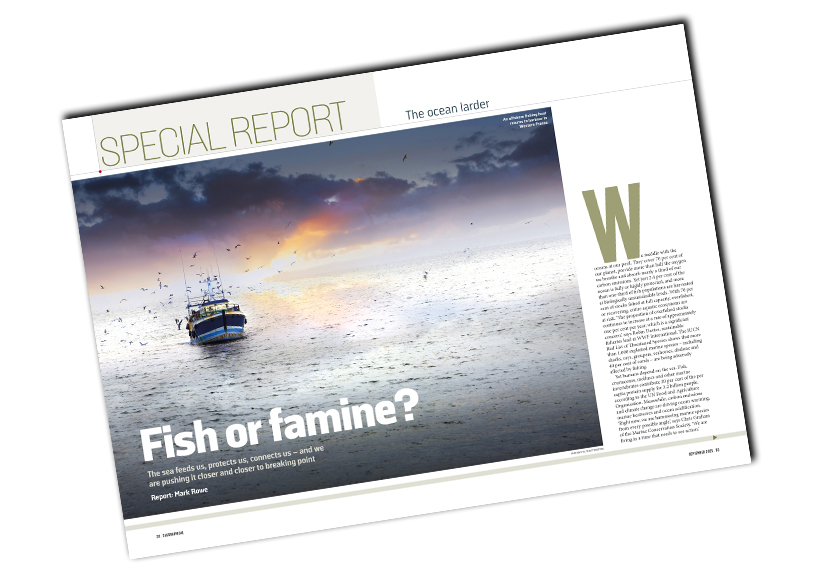
In this month’s special report, we dive deep into the future of our seas – and it’s a story of survival, innovation, and urgent decisions.
From overfishing to ocean warming, our marine ecosystems are under siege. Mark Rowe investigates how unsustainable fishing, climate change and habitat destruction are hammering the life out of our ocean larder – and what that means for the billions who rely on it. With 70 per cent of fish stocks now either overexploited or maxed out, are we fishing ourselves into famine?
But it’s not all doom and gloom. The report showcases new frontiers in sustainable fishing – from LED-lit ‘disco scallop’ pots to rotating sea zones around the Isle of Man. In Australia and the US, turtle excluder devices are slashing bycatch. Globally, smarter surveillance tools are tracking illegal ‘dark fleets’ like never before. Could technology and cooperation be the key to ocean recovery?
Meanwhile, Bryony Cottam explores how former fishers in Dover and Folkestone are finding new hope – by helping swimmers cross the Channel. As traditional stocks collapse, could cold water courage help keep coastal communities afloat?
Hidden methane menace at sea
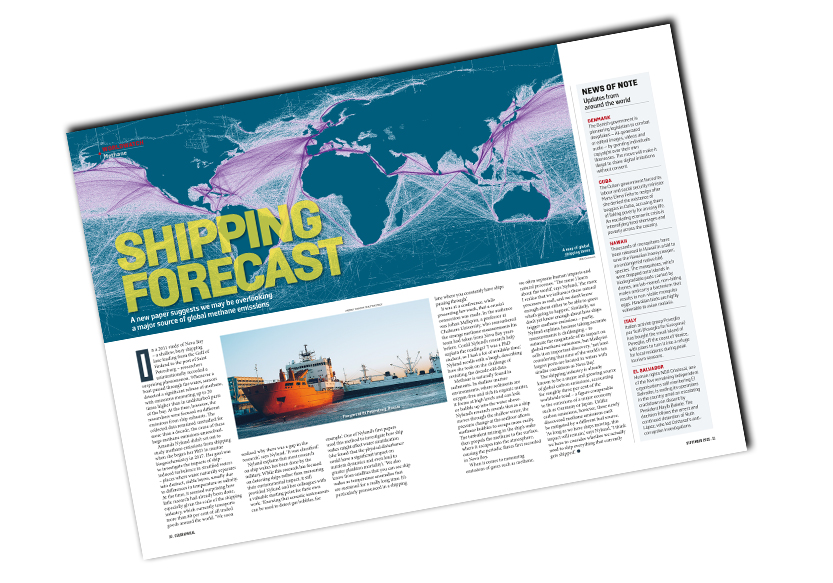
A chance rediscovery has placed ships in the spotlight for all the wrong reasons. Amanda Nylund’s PhD research into ship turbulence led her to revisit mysterious methane spikes recorded in Neva Bay back in 2011.
Her findings? As ships pass through shallow, stratified waters, they churn up seabed sediments, releasing trapped methane into the atmosphere. The emissions aren’t trivial—up to 20 times higher than background levels.
With nine of the world’s ten largest ports located in similar waters, the implications could be global. Unlike CO2, this isn’t a fuel-type issue. As Nylund warns, ‘As long as we have ships moving, this impact will remain.’
Is there still space for peace amid war?

As the conflict in Gaza continues, the numbers are stark: nearly 60,000 Palestinians have died – including over 17,000 children – while more than 2,000 Israelis have also lost their lives. The majority of Gaza’s infrastructure has been destroyed, leaving hospitals barely operational and basic needs like food and clean water in short supply. Two million people have been displaced.
It’s easy to stop at the statistics. But beyond the headlines, something else is happening. A coalition of over 60 Israeli and Palestinian civil society organisations, known as ‘It’s Time’, is pushing for an immediate and permanent ceasefire – and more than that, for a lasting peace grounded in security, equality, and justice.
Could this be the moment when civil society helps change the course of history?
Maya Savir, a human rights and peace-building advocate based in Tel Aviv, highlights the crucial role of grassroots movements in conflict resolution. From joint Arab-Jewish marches in Israel to cross-border collaborations and summits abroad, activists are calling for inclusive dialogue that brings all communities to the table – not just political leaders.
This war, they argue, must not become just another chapter in a long conflict.
Mangrove magic
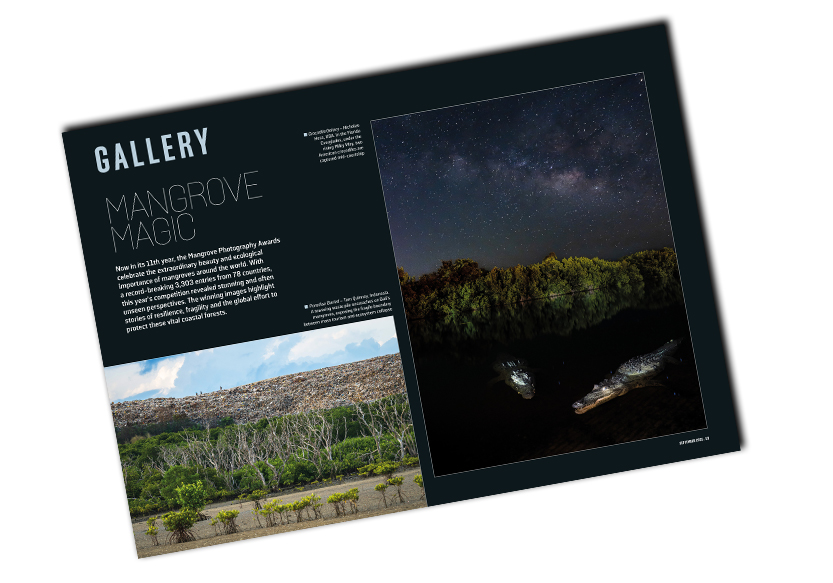
Now in its 11th year, the Mangrove Photography Awards once again cast light—quite literally—on the ecological, cultural and emotional importance of mangrove ecosystems. With over 3,300 entries from 78 countries, this year’s finalists captured both wonder and warning.
Among the highlights: a starlit portrait of crocodiles courting beneath the Milky Way in Florida (Crocodile Galaxy by Nicholas Hess), and a shocking juxtaposition of natural beauty and human impact in Bali (Paradise Buried by Tom Quinney), where a landfill looms over retreating green.
Other standouts include a cheeky hermit crab snapped mid-scuttle in Australia, a spoonbill flock gliding over a hunting shark in Florida Bay, and a rare view of six sub-adult cheetahs in Botswana. From aerial shots of desert mangroves in the UAE to images of tradition and resilience in Indonesia and the Philippines, the gallery is as diverse as the forests it honours.
The island of meaning
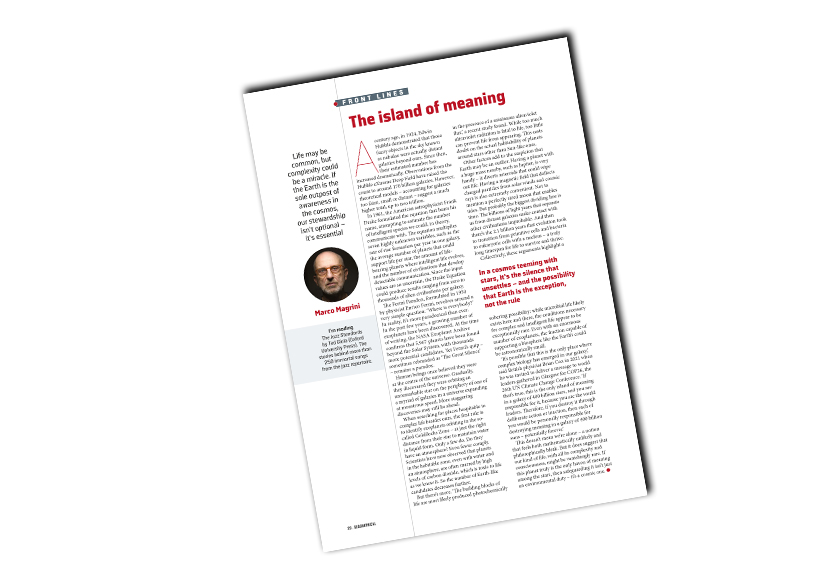
Nearly a century after Edwin Hubble proved we’re not the centre of the universe, our cosmic loneliness might be even more profound than imagined. Marco Magrini revisits the Fermi Paradox – ‘Where is everybody?’ – and finds no clearer answer.
With nearly 6,000 exoplanets discovered, and theoretical models predicting up to two trillion galaxies, the odds of life seem vast. Yet the reality may be sobering: Earth’s precise cocktail of conditions – a protective magnetic field, nearby gas giant to deflect asteroids, a just-right moon, and billions of years of biological evolution – might be staggeringly rare.
While microbial life may be scattered across the stars, intelligent life like ours could be vanishingly scarce. A recent study even suggests that too little or too much ultraviolet light could inhibit the chemical reactions needed for life’s origin.
As Magrini puts it, Earth might be ‘the only island of meaning’ in the galaxy – a sentiment echoed by physicist Brian Cox at COP26. If true, our responsibility extends beyond climate politics. Stewardship of this planet becomes not just vital, but sacred – a cosmic imperative.
Botswana’s ‘quiet safari’ revolution

In a world where safaris too often resemble traffic jams with lions, Anthony Ham ventures deep into Botswana’s Okavango Delta to rediscover the wild as it once was—solitary, silent, soul-stirring.
Contrasting the mass tourism of places like Kenya’s Maasai Mara, where cheetahs are surrounded by 67 vehicles at once, Botswana’s high-cost, low-impact model preserves space for nature to breathe.
Travelling between tented camps and solo in his 4WD, Ham encounters big cats, wild dogs and elephants—not with crowds, but alone or with a handful of others. He acknowledges the privileges and contradictions of luxury press trips, yet his wonder remains sincere. A leopard visits his campfire. Wild dogs hunt at dusk. And through it all runs a quiet critique of our consumption of wilderness.
With sparse infrastructure, vast protected areas, and a national strategy that prizes conservation over volume, Botswana has achieved what many destinations have lost. ‘Not all safaris are like this,’ Ham writes, ‘but they should be.’

